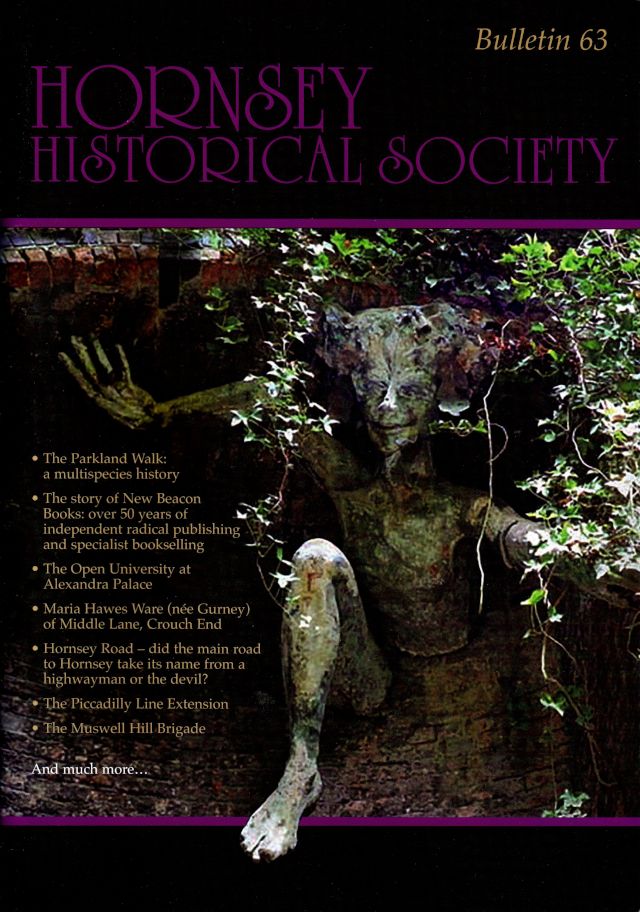Bulletin 63 appears after another difficult year for the Society during the continued pandemic, but one where we did at least manage to celebrate our 50th anniversary with cake and fizz at the Old Schoolhouse, undeterred by wild winds and rain.
Sadly, we lost our Sales Manager and long-time Bulletin Editor, Albert Pinching, who died in the summer and who will be much missed.

The content of our journal this year is particularly diverse, ranging from articles which combine personal stories with social history to accounts of significant local landmarks and institutions dating from the time of the Doomsday Book up to the present day. It is especially pleasing to note that more than half of the articles are written by new contributors.
- Michael La Rose describes the evolution of New Beacon Books, set up 50 years ago in Hornsey by his father, and its contribution to black lives and culture in this country.
- Roger Hancock and Kirsten Forrest provide an account of the Open University in its formative years at Alexandra Palace.
- Hugh Flouch investigates the origins of the name of a local road, Brian Lancaster describes the activities of a 19th century radical thinker based in Muswell Hill.
- Harry Taylor uses the words of Paul Saxton, the Crouch End paperseller, to describe his long career in this role.
- Jeremy Buck traces the cinema- going activities of local man in the 1950s though his newspaper cuttings.
- Catherine Lima describes the use of a photo album to document the history of her school.
The other contributions are just as varied, in approaches and in content.
- Patrick Hegarty-Morrish explores a local nature reserve, the Parkland Walk, as an example of the interplay between civilisation and wildness.
- Deirdre Dean shows how the extension of the Piccadilly Line from Finsbury Park to Cockfosters was achieved against various kinds of opposition.
- John Hinshelwood throws light on the career of a Victorian woman commemorated in a local monument.
I hope all readers will find something to enjoy in these rich offerings and their celebration of the diversity of our local history.
Once again, I must thank the members of the Publications Committee of the HHS, who have done so much towards the production of this Bulletin, especially Janet Owen and David Winskill, without whose valiant efforts it would not have come to fruition. Patrick Hegarty-Morrish has kindly helped with the work of editing.
Free to members
The current issue of the Bulletin is free each year to all members. If you aren’t a member and would like to join you can find details on the membership page. As well as the Bulletin, members also receive our quarterly newsletters, free entry to all our monthly lectures and advanced invitations to all special events and outings when they restart.
Buy the Bulletin
Bulletin 63 can be purchased online by non-members for £7.50 +p&p.
We aim to send out all items within 5-7 days, but as a small Society run entirely by volunteers turnaround times may sometimes vary.
Write for the Bulletin
We welcome contributions to the Bulletin from interested authors, who do not need to be members of the Society. Articles for inclusion should be concerned with Hornsey, its residents and its history. A length of about 2-3000 words is suggested, but shorter pieces such as letters or reviews of books about local history can also be accepted.
All articles are read prior to acceptance by members of the Publications Committee, who may suggest revisions. Material should be sent by email attachment in Word format (not PDF) to the Editor, Professor Sandra Clark, who will be happy to deal with any questions about potential contributions. Illustrations are encouraged.